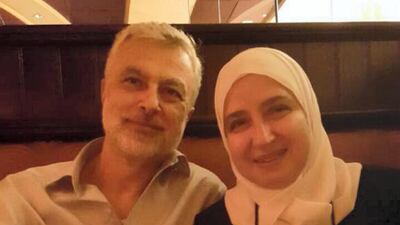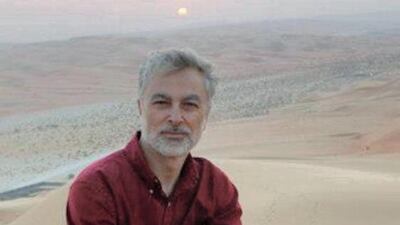Related: Emirati friend of hostage Majd Kamalmaz hopes mental strength will help him survive
It has been three years since American psychotherapist Majd Kamalmaz disappeared in Syria but his family refuse to give up hope that he will soon return home.
Despite a high-level diplomatic mission to Damascus by US officials, the Syrian government has yet to acknowledge the capture of Mr Kamalmaz, 62, a pioneer in regional mental health support with strong ties to the UAE.
It is not known whether he is still alive or why he was detained shortly after entering Syria from Lebanon in 2017 to work with refugees traumatised by war.
His family now fear a potential change in administration after the US presidential election could stall recent negotiations that opened new dialogue with his captors.
Mr Kamalmaz’s son, Ibrahim – who lives in Dubai – firmly believes his father is still alive.
"An acknowledgement of his detention is the first baby step to getting my father home," he said in an interview with The National.
“The US government has done its due diligence and we know he is there and is being held by the Syrian government.”
Information was passed to the family after an appeal circulated on social media in Lebanon, Syria and Turkey to find anyone from Damascus who may be able to help.
A former prison worker contacted the family through a third party to confirm he had been captured and detained shortly after arriving in Syria in January, 2017.
They have yet to see any proof of life, but refuse to give up hope they will be reunited.
Mr Kamalmaz, who moved to the US from Syria at the age of seven, is well known in the UAE for his work developing counselling and support for Emirati servicemen and for improving treatment for those requiring long-term care.
Prior to his detention, he had established a successful support centre for women and children refugees in Lebanon who suffered conflict trauma.
He also previously worked as a mental health professional with the Family Development Foundation in Abu Dhabi, providing counselling for Emiratis.
The UAE’s Ambassador to the US, Yousef Al Otaiba, said he had acted as a messenger on behalf of the Kamalmaz family to confirm Majd’s exact whereabouts.
Ibrahim, 31, hopes the Emirates will continue to monitor his father’s case should Donald Trump lose next month’s election, but knows much depends on US intervention.
“The UAE has established an embassy in Damascus, but without an acknowledgement my father is in the country they are unable to pursue his case,” he said.
“My father has been in the UAE for a long time. He worked with the CID in Abu Dhabi and was passionate about improving the conditions for people who required long-term care.
Fears for captives’ health during pandemic
“I am concerned any political transition in the US could delay things but we are confident whomever wins the election they will be focused on returning detainees.
“We are fearful of my father’s health, particularly during the pandemic.
“We want to continue the development and momentum that has already occurred.”
Like his mother and two sisters, Ibrahim has not seen his father for more than three years.
They lost contact shortly after he arrived in Syria, where he had planned to visit family and considered opening a mental health centre to help people badly affected by years of civil war.
His disappearance was kept out of the public domain for two years as unofficial sources on the ground worked behind the scenes to find Mr Kamalmaz and return him to the US.
When the family eventually notified the US state department of his disappearance, Ibrahim said all dialogue with Syria stopped.
“At the start, it was pretty low-level stuff,” he said.
“As a family we reached out to different sources who said they could get him out without any issues.
“They asked why my father was of interest to the US and speculated he was high value, and he was withdrawn to a secret location.
“Our father has been held for almost four years without a trial, a right to a lawyer or contact with the outside world.”
Mr Kamalmaz is believed to be held with Austin Tice, a freelance journalist seized while reporting on the Syrian civil war in 2012.
Sanctions arising from Caesar’s Law, which came into effect in June, severely penalises any governments thought to be dealing with the Al Assad government, making negotiations to free hostages challenging.
“It has been hard on my grandmother in particular,” said Ibrahim, who plans to return to Dubai from the US on November 4.
“Her only son is detained, she does not know if he is either dead or alive, or if she will see him again.
“She is losing her eyesight due to stress. We are maintaining resilient hope as a family but it is difficult to stay optimistic.
“My mother has lost a husband, and there is a grey area of not being able to move on until we know what has happened.
“Everything she does is planned around his return.
“We remain hopeful he will come back healthy, write a book and return to his job helping others as a mental health expert.”
Mr Al Otaiba told The National he would continue to update the Kamalmaz family with any progress on bringing Majd home.
“We’ve passed messages on behalf of the family in order to assist in locating Mr Kamalmaz,” he said.
“We’ll continue these efforts and hope the family can be reunited one day soon.”









